
Pledge a Pad. The Gift of Dignity.
‘Project Butterfly’ is a menstrual hygiene awareness and management program specially designed for the underprivileged girls living in India.
The goal of this project is to instil confidence in girls and to empower them through provision of Sanitary napkins and capacity building on menstrual hygiene management education and facilities to the girls in school.
Let’s empower these adolescent girls by extending our support to this project and by sponsoring the girls for their menstrual hygiene and management.
All that is needed is a small amount of Indian Rupees five hundred (₹500) for whole one year for one girl child to manage her monthly menstrual flows hygienically and with dignity.
Come! Let’s Pledge a Pad. The Gift of Dignity. With this gift of dignity, we can help them transform their lives thereby transforming our communities and hence our Nation.
WHY THIS PROJECT BUTTERFLY ?
From our medical camp and research, we have learnt that a large number of underprivileged girls studying in Government schools drop out or miss their school days during menstruation for about 3-5 days every month just because of their inability and also due to lack of adequate knowledge to manage their menstrual flows hygienically.
We came across girls who used most unhygienic ways and means to manage their monthly flows. Some of which are using their old school socks at times filled with sand, old rags, dirty cloth, damp cloth, same cloth shared by the women in their family say sisters and mother, cloth never dried under the sun due to embarrassment which means it never gets disinfected, same pad being used for two continuous days as it still has the capacity to absorb etc..
The following are some of the major findings of our study coupled with the above shocking practices along with poor sanitation facilities at schools which influenced us to immediately identify these issues relating to menstrual hygiene and sanitation as need of the hour and address them accordingly.








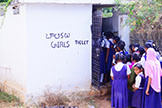
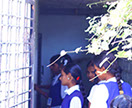
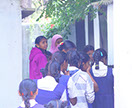
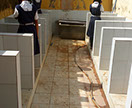

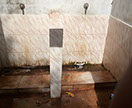

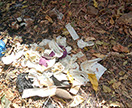
Oh God! When will my turn come? :(
Please come out fast!
Unbearable sewage odor! But no choice :(
Yes ! These are our school urinals with no water connection. Looking neat right? Have a closer look and feel the smell. The only option available for all of us who fear to openly urinate in the bushes :(
Thank you English teacher for teaching us the meaning of the idiom ' Don't judge a book by its cover '
Don't Mistake them for shower taps!! ;) These are the taps which remind us their presence while we urinate
I need to change my sanitary pad now ! How do I enter? This is the only toilet which has a door and access to water
Uff!! finally i changed my soiled napkin. Yes, this is the place where we dispose our menstrual/sanitary wastes. It's not far away ... It's just in front of our toilets
We have decided to start this initiative as a pilot project covering four government schools and we hope that we will be able to replicate such programs for several other needy children too in the near future.
- Girls often go home half way just because they got their period and do not know how to deal with menstruation such as manage their flows, cramps etc.
- Their inability to afford for the commercial sanitary napkins that are available in the market which are expensive and hence end up using unhygienic ways to manage their flows.
- No access to proper sanitation facilities at school.
- Fear of staining their school uniform due to leakage from poor materials they use for protection such as old cloth leading to low self esteem and embarrassment.
- Lack of privacy for changing their menstrual materials.
- Lack of adequate resources for washing such as soap and water both at school and home.
- Limited knowledge about their body, puberty and menstruation.
- Inadequate waste disposal facilities
- No proper guidance and counseling
- Unsupportive attitude of men at schools, home, shops etc.
- Surrounded by myths, misconceptions, and cultural/religious taboos.
‘Project Butterfly' is not just about supplying the sanitary napkins to young girls in need but it also focuses on raising awareness and making a significant difference in their lives through proper education, counseling and monitoring the impact of this project on their well-being at regular intervals.
Ensuring regular supply of disposable pads at an affordable cost is quite challenging on one side, while safe disposal of these soiled napkins is an equally challenging issue on the other side that needs to be taken care of as unsafe disposal leads to environmental and health hazards.
Considering all these factors, this project is designed in such a way that not just team Anarghya along with volunteers, but also the girl herself, the school management and parents are all made responsible for helping and supporting the girls to manage their monthly flows hygienically and confidently thereby making an impact on improving the lives of these young girls.
EXPECTED RESULTS/OUTCOMES OF THIS PROJECT
- No dropouts
- Reduced absenteeism
- Empowered girls
- Improved water and sanitation facilities
- Easy access to sanitary napkins
- No more health issues such as Urinary tract infections
- Effective pain management
- Safe disposal of soiled napkins both at schools and home
- Adequate knowledge about their bodies, sexual and reproductive health
- Clear picture about the myths, misconceptions and taboos
- Change in perception towards menstruation
- Sense of dignity
Ultimately, this project helps the girls stay at school during menstruation and also helps them stay dignified as they will be bestowed with the necessary materials, knowledge and facilities to manage their menstruation hygienically and thus lead a healthy life with dignity.
Why does Menstrual Hygiene Matter?
Menstruation is a natural process. A woman menstruates for about 40 years in her lifetime and hence effective Menstrual Hygiene is vital to health, dignity, wellbeing and productivity of women and girls. But in most parts of our country it is still a taboo and hence is rarely talked about.
During menstruation, hygiene related practices of adolescent girls and women are of considerable importance as it may increase the vulnerability to Reproductive Tract Infections (RTI’s).
Some of the common infections associated with reproductive tract are:
• Bacterial vaginosis • Vulvovaginal candidiasis • Urinary Tract Infections • Hepatitis B
• Trichomonas Vaginalis • Pelvic inflammatory disease • Vaginitis • Syphilis • Chlamydia
To manage menstruation hygienically and with dignity, it is essential that women and girls have access to clean water, materials for absorbing menstrual blood, private spaces for washing and cleaning, facilities for safe disposal of used menstrual hygiene materials etc..
The following are the findings of the study carried out by global information and measurement company AC Nielsen, and reviewed and endorsed by NGO Plan India, throwing light on the dismal state of feminine hygiene care in India.
- Only 12% of India's 355 million menstruating women use sanitary napkins.
- Incidents of Reproductive Tract Infection (RTI) are 70% more common among those women with unhygienic sanitary practices.
- Inadequate menstrual protection makes adolescent girls (age group 12-18 years) miss 5 days of school in a month (50 days a year). Around 23% of these girls actually drop out of school after they started menstruating.
- The biggest barrier to using a sanitary napkin is affordability. Around 70% of women in India say their family can't afford to buy them.
- 97% of gynecologists surveyed believe that sanitary napkins can act as a preventive measure against reproductive tract infection
- The survey said 64 % of gynecologists noted that sanitary napkins can act as a precautionary measure to reduce the risk of cervical cancer among women.
- According to gynecologists, use of alternative sanitary care measures such as unsterilized cloths, sand and ash make women susceptible to infections and diseases.
- The study found that awareness on basic health and feminine hygiene is very low, with 75% rural women lacking adequate knowledge on menstrual hygiene and care.
- On the issue of affordability of quality sanitary care, the survey found that 81% rural women use unsterilized cloths since they are cheaper and 68 per cent said they cannot afford to buy sanitary napkins.
- Poor financial condition does not allow majority of the women to buy quality sanitary napkins, the survey said, adding of cloth users, 45% reuse cloth and 70% dry them in the shade, increasing chances of infections.
Contact Info
Telephone: +91 9133111125
E-mail: anarghya.org@gmail.com
© Copyright 2021 by Anarghya.org. All Rights Reserved.


